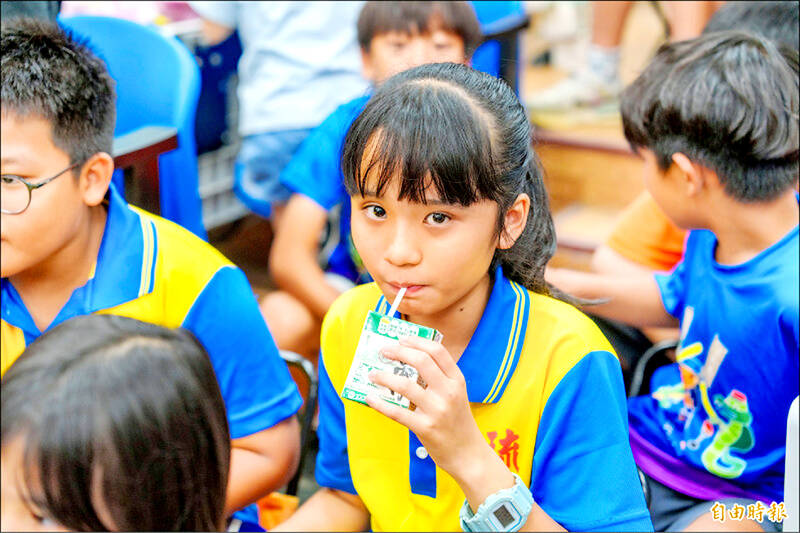Calcium-fortified soy milk is to be provided as an alternative to dairy milk for elementary-school students starting from the middle of next month at the earliest, the Ministry of Agriculture said yesterday, as part of its policy implemented this term to provide students with milk twice a week.
The ministry is implementing the policy in elementary schools and kindergartens, following in the footsteps of the US and Japan, which have long provided students with milk to supplement calcium intake and support growth.
Students can choose between ultra-pasteurized milk, which has a long shelf life, fresh milk and calcium-fortified soy milk for those who are lactose intolerant.

Photo: Taipei Times
Due to concerns about refrigeration, more than 70 percent of schools choose ultra-pasteurized milk and less than 30 percent choose fresh milk, while 2.2 percent of students are lactose intolerant, according to a survey by the Ministry of Education.
Most elementary-school students are already receiving domestically produced milk this term, but soy milk has been unavailable because a supplier was only confirmed on Sunday, the agriculture ministry said yesterday.
Students are entitled to two servings of milk per week, 44 per term, but this term’s soy milk quota would roll over into next term to ensure a balanced intake for students, agriculture the ministry said.
The agriculture ministry has worked with suppliers to guarantee that fresh milk is delivered in cool bags, which keep milk effectively refrigerated for up to 90 minutes.
However, teachers, concerned about fresh milk going sour, often require students to drink the milk as soon as it arrives.
The agriculture ministry is working with local governments to inform schools about the effectiveness of the cool bags.

The Ministry of Education (MOE) is to launch a new program to encourage international students to stay in Taiwan and explore job opportunities here after graduation, Deputy Minister of Education Yeh Ping-cheng (葉丙成) said on Friday. The government would provide full scholarships for international students to further their studies for two years in Taiwan, so those who want to pursue a master’s degree can consider applying for the program, he said. The fields included are science, technology, engineering, mathematics, semiconductors and finance, Yeh added. The program, called “Intense 2+2,” would also assist international students who completed the two years of further studies in

Former president Tsai Ing-wen (蔡英文) departed for Europe on Friday night, with planned stops in Lithuania and Denmark. Tsai arrived at Taiwan Taoyuan International Airport on Friday night, but did not speak to reporters before departing. Tsai wrote on social media later that the purpose of the trip was to reaffirm the commitment of Taiwanese to working with democratic allies to promote regional security and stability, upholding freedom and democracy, and defending their homeland. She also expressed hope that through joint efforts, Taiwan and Europe would continue to be partners building up economic resilience on the global stage. The former president was to first

Former president Tsai Ing-wen (蔡英文) on Monday called for greater cooperation between Taiwan, Lithuania and the EU to counter threats to information security, including attacks on undersea cables and other critical infrastructure. In a speech at Vilnius University in the Lithuanian capital, Tsai highlighted recent incidents in which vital undersea cables — essential for cross-border data transmission — were severed in the Taiwan Strait and the Baltic Sea over the past year. Taiwanese authorities suspect Chinese sabotage in the incidents near Taiwan’s waters, while EU leaders have said Russia is the likely culprit behind similar breaches in the Baltic. “Taiwan and our European

The Taipei District Court sentenced babysitters Liu Tsai-hsuan (劉彩萱) and Liu Jou-lin (劉若琳) to life and 18 years in prison respectively today for causing the death of a one-year-old boy in December 2023. The Taipei District Prosecutors’ Office said that Liu Tsai-hsuan was entrusted with the care of a one-year-old boy, nicknamed Kai Kai (剴剴), in August 2023 by the Child Welfare League Foundation. From Sept. 1 to Dec. 23 that year, she and her sister Liu Jou-lin allegedly committed acts of abuse against the boy, who was rushed to the hospital with severe injuries on Dec. 24, 2023, but did not